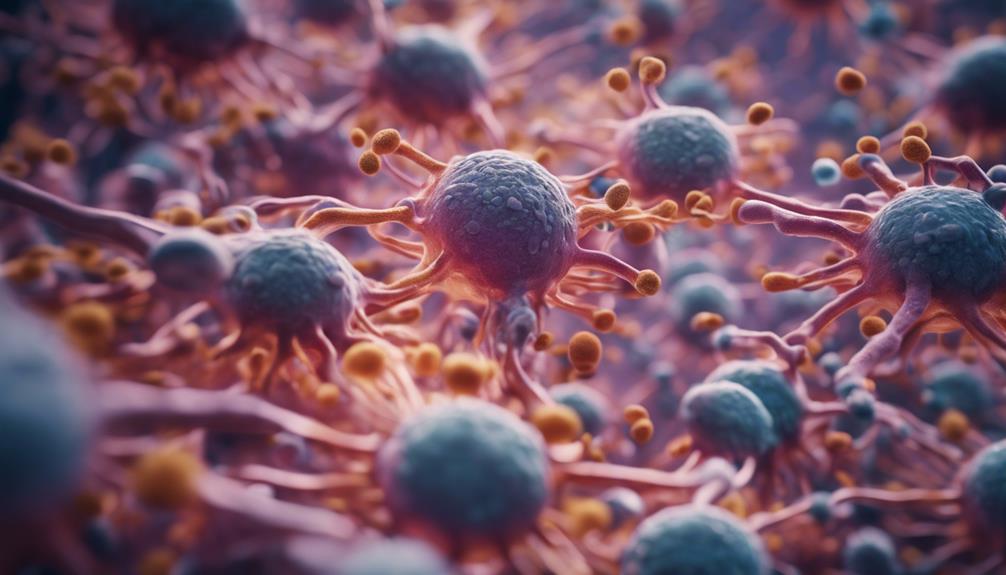The Truth About Intermittent Fasting and Health
Have you ever wondered if intermittent fasting truly lives up to its health claims?
The debate surrounding this popular practice continues to intrigue many, and for good reason.
As you explore the intricacies of how intermittent fasting can impact your health, you may be surprised by the depth of its effects on the body.
Key Takeaways
- Intermittent fasting boosts energy, aids in weight loss, and supports overall well-being.
- Hormonal balance and metabolic benefits contribute to weight management success.
- Autophagy promotes cellular repair, muscle preservation, and fat loss.
- Mindful implementation is key to reaping the health rewards of intermittent fasting.
Intermittent Fasting Basics
To understand intermittent fasting basics, start by recognizing that it's an eating pattern where you cycle between periods of eating and fasting. Fasting schedules vary, with popular methods including the 16/8 method where you fast for 16 hours and eat within an 8-hour window, or the 5:2 method where you eat normally for five days and restrict calories for the other two.
It's essential to maintain nutritional balance during eating periods to ensure you're getting adequate nutrients. Focus on whole foods like fruits, vegetables, lean proteins, and whole grains to support your overall health.
When structuring your fasting periods, consider your lifestyle and choose a method that aligns with your routine. Experiment with different schedules to find what works best for you. Remember, intermittent fasting isn't just about weight loss; it can also offer benefits for your metabolic health and cellular function.
Stay mindful of your body's signals and adjust your fasting and eating times accordingly to achieve optimal results in a sustainable manner.
Benefits of Intermittent Fasting
Intermittent fasting offers a range of health benefits beyond just weight management, impacting various aspects of your overall well-being. By adopting intermittent fasting, you can experience improvements in:
- Energy Levels: Through intermittent fasting, your body can enhance its metabolic processes, leading to more efficient energy production. This can result in increased vitality and decreased feelings of fatigue throughout the day.
- Mental Clarity: Fasting periods have been linked to improved cognitive function and mental clarity. By giving your body designated breaks from digestion, you allow your brain to focus better, leading to increased concentration and productivity.
- Cellular Repair: During fasting periods, your body initiates a process called autophagy, where it breaks down dysfunctional proteins and components within cells. This cellular repair mechanism can help in the prevention of various diseases and promote overall longevity.
These benefits of intermittent fasting go beyond just physical health, contributing to a holistic enhancement of your well-being.
Different Intermittent Fasting Methods
Enhancing your understanding of various intermittent fasting methods can empower you to choose the approach that best aligns with your health goals and lifestyle. Fasting schedules and variations play a crucial role in intermittent fasting.
The 16/8 method involves fasting for 16 hours and eating within an 8-hour window each day. This method is popular due to its simplicity and flexibility.
Another approach is the 5:2 method, where you eat normally for five days and restrict calorie intake for two non-consecutive days.
Alternate-day fasting involves alternating between fasting days and regular eating days.
Health effects of intermittent fasting include weight loss, improved metabolic health, and enhanced cellular repair processes. It's essential to address misconceptions like fasting leading to muscle loss, which research has shown to be minimal if protein intake is adequate.
How Intermittent Fasting Affects Hormones
Understanding how intermittent fasting affects hormones is crucial in comprehending the physiological changes that occur during fasting periods. When you engage in intermittent fasting, your body's hormonal balance undergoes significant alterations, influencing various aspects of your health and well-being.
Here are three key points to consider:
- Hormonal Balance: Intermittent fasting can impact insulin sensitivity and levels of growth hormone, which play essential roles in metabolism and cellular repair.
- Energy Levels: By modulating hormones like adrenaline and noradrenaline, intermittent fasting can enhance your energy levels and mental clarity during the fasting periods.
- Cortisol Regulation: Fasting can affect cortisol levels, the primary stress hormone. When done correctly, intermittent fasting may help regulate cortisol, leading to better stress management and overall health.
Intermittent Fasting and Weight Loss
Optimizing weight loss through intermittent fasting involves strategic meal timing and calorie intake control. By paying attention to meal timing, you can synchronize your eating window with your body's natural rhythms, potentially enhancing fat burning. This approach can help regulate hunger cues, allowing you to differentiate between true hunger and emotional eating triggers.
Intermittent fasting can be a practical tool for weight loss as it often leads to a reduction in overall calorie intake. By restricting the time frame in which you eat, you naturally limit the number of meals consumed, which can create a calorie deficit necessary for weight loss. Additionally, intermittent fasting has been shown to improve metabolic health, which can further support weight loss efforts.
Being mindful of your hunger cues and meal timing while practicing intermittent fasting can help you achieve your weight loss goals. Remember, the key isn't just when you eat, but also what and how much you eat during your eating window.
Impact of Intermittent Fasting on Metabolism
Intermittent fasting can significantly impact metabolism by influencing various metabolic processes in the body. It goes beyond just weight loss; here are three key ways it affects your metabolism:
- Metabolism Boost & Energy Levels: Intermittent fasting can kickstart your metabolism, leading to increased energy levels. When you fast, your body shifts from using glucose for energy to burning fat, which can enhance metabolic efficiency.
- Muscle Preservation: Contrary to common fears, intermittent fasting can actually help preserve muscle mass. During fasting periods, your body produces more human growth hormone, which aids in maintaining muscle while promoting fat loss.
- Fat Loss: By promoting fat oxidation, intermittent fasting can aid in shedding excess fat. When the body is in a fasted state, it becomes more efficient at using stored fat for energy, resulting in gradual fat loss.
Understanding how intermittent fasting impacts your metabolism can empower you to make informed decisions regarding your health and wellness goals.
Intermittent Fasting and Autophagy
Exploring the relationship between intermittent fasting and autophagy provides insights into cellular rejuvenation processes. Autophagy, a cellular process that removes damaged components and promotes regeneration, is a key player in maintaining cellular health. Research on intermittent fasting has shown that it can enhance autophagy, leading to a range of benefits for your body.
Studies have indicated that intermittent fasting can stimulate autophagy, helping to clear out dysfunctional proteins and organelles within cells. This process can contribute to improved cellular function, longevity, and overall health. By allowing cells to undergo autophagy through intermittent fasting, you're essentially facilitating a natural cleansing and renewal process within your body.
These autophagy benefits aren't only limited to cellular health but can also have implications for various health conditions, including neurodegenerative diseases and cancer. By incorporating intermittent fasting into your routine, you may harness the power of autophagy to support your cellular health and overall well-being.
Intermittent Fasting and Cellular Repair
Enhancing cellular repair through intermittent fasting can promote longevity and overall cellular health. When you give your body a break from constant digestion, it can focus on repairing and rejuvenating cells, leading to a cascade of beneficial effects.
Here are three key points to consider:
- Cellular Regeneration: Intermittent fasting triggers a process called autophagy, where your cells remove damaged components and regenerate healthier ones. This cleansing process is essential for maintaining optimal cellular function and can help prevent age-related diseases.
- Longevity Benefits: By supporting cellular repair mechanisms, intermittent fasting has been linked to an increase in lifespan. Studies suggest that the enhanced cellular health resulting from fasting may contribute to a longer and healthier life.
- Overall Cellular Health: Giving your cells the opportunity to rest and repair during fasting periods can improve their resilience and functionality. This, in turn, can have a positive impact on various aspects of your health, from metabolism to immune function.
Intermittent Fasting for Brain Health
Transitioning from cellular repair to cognitive function,
optimizing brain health through intermittent fasting is a compelling approach that may offer various benefits for mental clarity and cognitive performance.
Studies suggest that intermittent fasting can support brain function by promoting the production of brain-derived neurotrophic factor (BDNF), a protein that aids in the growth and maintenance of nerve cells.
This, in turn, may enhance cognitive performance, memory, and overall brain health.
Additionally, intermittent fasting has been linked to reduced inflammation in the brain, which is crucial for maintaining optimal cognitive function.
Intermittent Fasting and Inflammation
Intermittent fasting has shown promising effects in reducing inflammation markers throughout the body, which can have significant implications for overall health and disease prevention. When considering intermittent fasting and inflammation, it's essential to understand how this eating pattern influences your body's immune response. Here are three key points to consider:
- Decreased Inflammatory Markers: Studies suggest that intermittent fasting may lead to a decrease in inflammatory markers such as C-reactive protein (CRP) and interleukin-6, which are associated with various chronic diseases.
- Enhanced Immune Response: By reducing inflammation, intermittent fasting may help enhance the immune response, making your body more efficient at fighting off infections and illnesses.
- Balanced Immune Function: Intermittent fasting has the potential to promote a balanced immune function by modulating inflammatory pathways, which could contribute to overall well-being and health maintenance.
Understanding how intermittent fasting affects inflammation can empower you to make informed decisions about your health and well-being.
Risks and Considerations of Intermittent Fasting
When considering intermittent fasting, it is crucial to understand the potential risks and important considerations associated with this eating pattern. While intermittent fasting can offer various health benefits, it is not suitable for everyone. Here are some key risks and considerations to keep in mind before starting an intermittent fasting regimen:
| Potential Risks | Dietary Restrictions |
|---|---|
| Nutrient Deficiencies | Disordered Eating Habits |
| Increased Hunger | Impact on Social Life |
| Low Energy Levels | Medical Conditions |
One potential risk of intermittent fasting is the possibility of developing nutrient deficiencies if the eating window is not carefully planned to include a variety of essential nutrients. Additionally, some individuals may experience increased hunger, low energy levels, or the development of disordered eating habits. Moreover, intermittent fasting may impact social activities that revolve around meals and can be challenging for individuals with certain medical conditions. It is essential to consult with a healthcare professional before embarking on an intermittent fasting journey to ensure it aligns with your health goals and needs.
Incorporating Intermittent Fasting Into Your Routine
Incorporating intermittent fasting into your routine can be a beneficial way to optimize your health and wellness. When starting this practice, it's essential to consider a few key points:
- Meal Timing: Plan your eating window during a time that aligns with your body's natural rhythm. For example, if you're more active in the mornings, you might prefer to have your first meal earlier in the day.
- Hunger Signals: Pay attention to your body's hunger cues. It's normal to feel hungry during fasting periods, but it's crucial to distinguish between true hunger and emotional or habitual cravings.
- Stay Hydrated: Drinking an adequate amount of water is important when fasting. Water helps stave off hunger pangs and keeps your body functioning optimally.
Frequently Asked Questions
Can Intermittent Fasting Help Improve Skin Health and Appearance?
Intermittent fasting can potentially aid in skin rejuvenation by promoting cellular repair processes. It may offer anti-aging benefits, stimulating the production of collagen and reducing oxidative stress. Remember to consult with a healthcare professional for personalized advice.
Is There a Recommended Age Range for Individuals to Start Practicing Intermittent Fasting?
For adolescents, there isn't a set age for starting intermittent fasting; consult a healthcare provider. Elderly individuals can benefit from fasting but should also seek medical advice due to potential health considerations.
Can Intermittent Fasting Have an Impact on Fertility and Reproductive Health?
Intermittent fasting can influence hormonal balance, potentially affecting the ovulation cycle. It's crucial to consider how this eating pattern may impact fertility and reproductive health. Stay informed about these potential effects to make empowered choices.
Are There Specific Foods or Supplements That Should Be Avoided During Intermittent Fasting?
During intermittent fasting, it's wise to moderate sugar intake to avoid blood sugar spikes. Be mindful of caffeine consumption as it may affect your fasting state. Protein supplements and vitamins are generally safe if they don't break your fast.
How Does Intermittent Fasting Affect Athletic Performance and Muscle Gain in Individuals Who Engage in Regular Exercise?
When you engage in regular exercise, intermittent fasting can impact athletic performance and muscle gain. Ensure protein intake is adequate, focus on workout timing, and consider how it aligns with endurance training for optimal results and muscle preservation.
Conclusion
In conclusion, intermittent fasting is like a reset button for your body, allowing it to optimize its function and promote overall health.
Just like a gardener prunes a plant to encourage new growth, intermittent fasting helps your body eliminate toxins and rejuvenate itself.
By incorporating this practice into your routine, you can experience a multitude of health benefits and improve your well-being in the long run.
Give it a try and watch yourself bloom!











